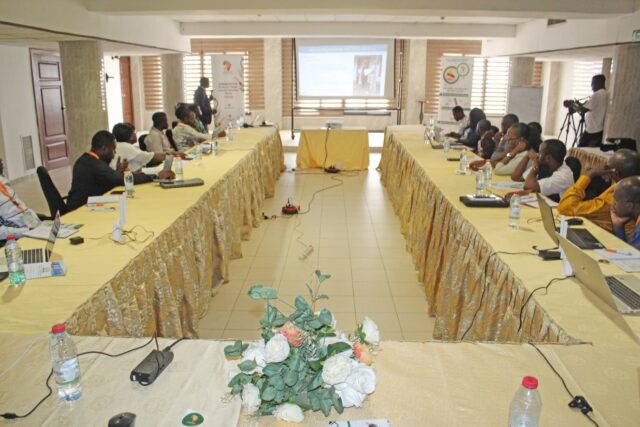On Thursday, March 28, 2024, African Consortium in Modeling for Effective Vector Control (ACoMVeC) organized a consultative Technical Vector Control Advisory Group (TVCAG) for Cameroon. It was the fourth TVCAG edition organised by CRID.
 This consultative TVCAG meeting brought together 35 participants from various organisations involved in vector control activities at different levels, including National Malaria Control Program (NMCP), Ministry of Health (MoH), Ministry of the Environment Protection of Nature and Sustainable Development (MINEPDED), Ministry of Agriculture and Rural Development (MINADER), United State Agency for International Development (USAID), Clinton Health Access Initiative (CHAI), Centre for Disease Control and Prevention (CDC), Pan-African Mosquito Control Association (PAMCA), Centre for Research in Infectious Diseases (CRID), and universities lecturers .
This consultative TVCAG meeting brought together 35 participants from various organisations involved in vector control activities at different levels, including National Malaria Control Program (NMCP), Ministry of Health (MoH), Ministry of the Environment Protection of Nature and Sustainable Development (MINEPDED), Ministry of Agriculture and Rural Development (MINADER), United State Agency for International Development (USAID), Clinton Health Access Initiative (CHAI), Centre for Disease Control and Prevention (CDC), Pan-African Mosquito Control Association (PAMCA), Centre for Research in Infectious Diseases (CRID), and universities lecturers .
The meeting started with an introduction by Prof Charles Wondji, Executive Director of CRID who presented the project namely African Consortium in Modeling for Effective Vector Control. He explained how mathematical modelling can help the National Malaria Control Program in particular to define the best strategy by combining old and new malaria control tools. He went on to say that one of the aims of the ACoMVeC project is to help the NMCP to use mathematical modelling to improve its ability to control malaria. Prof Flobert Njiokou Academic Director ACoMVeC and Deputy Executive Director at CRID did a presentation of ACoMVeC Technical Vector Control Advisory Group in order to inform participants about the ins and outs of TVCAG expert working group, which aims to inform the NMCP of the best strategies for combating malaria. Dr Ateba Joel, NMCP Permanent Secretary presented on “the malaria situation in Cameroon in 2023 and the contribution of mathematical modelling”. Dr Raymond Tabue, Head of the integrated vector control unit at NMCP, shared his experience with stakeholders on “the challenges of vector control in Cameroon”. Prof Ramsès Djidjou-Demasse, Head of Unit Modeling at CRID reminded the participants that the involvement of mathematicians in vector control dates back to the beginning of the 20th century with the work of Sir Donald ROSS, who showed that by keeping the mosquito population below a certain threshold, malaria could be controlled. Dr Antonio Nkondjio Country Coordinator for PAMCA then explained to participants “why we need innovation to eliminate malaria”. Prof Cyrille Ndo Head of Microbiology and Parasitology Department at CRID given a presentation about “Malaria vectors and transmission”, during which he gave a detailed account of the malaria vector and the various methods used by entomologists to estimate certain key entomological parameters concerning anopheles.
After three sessions and discussions, participants moved on to work in groups on three themes: insecticide/drug resistance, novel vector control tools and vector and transmission, with the aim of identifying the gaps in setting up operational research projects (ORP) in order to be able to define 5 project proposals to be implemented in a short space of time in order to provide the NMCP with evidence for efficient decision-making in malaria control in Cameroon.
Following this consultative, the small research projects adopted are as follows:
1) Modelling the impact of the distribution of a single type of LLIN on the territory;
2) Modelling the cost-effectiveness of indoor residual spraying compared with impregnated mosquito nets;
3) Modelling the impact of the level of coverage of LLIN use on malaria transmission;
4) Modelling the risks of emergence of resistance to ACTs in Cameroon;
5) Modelling the optimisation of SMC in Cameroon.
These small projects or grants will be implement the next 6 to 12 months and aims to help NMCP to strengthen his capacity in modelling, with a particular focus on malaria tools. The calls for applications for researchers and students about modelling will be launch the following days by CRID hosting ACoMVeC project.






